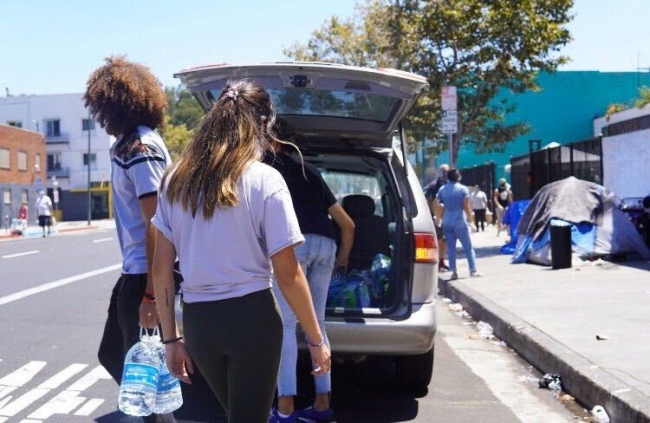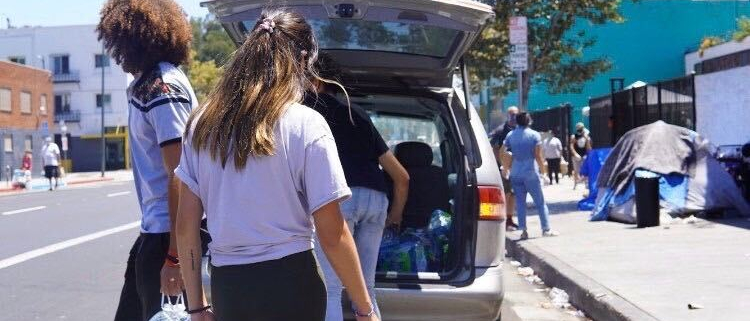Water Drop LA brings water to unhoused neighbors on Skid Row

Aria Cataño, Kate Montanez and Catie Cummings spend their Sundays bringing clean water to thousands of people experiencing homelessness on Skid Row. With eight water drops to date, the group has raised more than $365,000 in funds, according to Cataño, and has worked alongside fellow community organizers in Los Angeles to raise awareness about the needs of unhoused populations.
Inspired by a bag of groceries Cataño and Montanez received at a Black Lives Matter meeting in July, the three took Cataño’s Subaru to pass out burritos to people living outside of City Hall. However, those that they were aiding were still suffering from an inaccessibility to clean water. In Skid Row, there are only five public water fountains for a population of roughly 5,000 people. Community activists have demanded the installation of these fountains for years, but the city has yet to do so.
Realizing that there was still a need to be met, Cataño posted about the demand for water on her Facebook page and raised roughly $2,000 in just one day. These initial donations gave the group the momentum for its first water drop, starting what is now known as Water Drop LA. About 95% of the group’s distribution is at Skid Row, but the team also sends a small supply to the downtown Olvera Street area where it first started passing out the burritos weeks prior.
“The well-being of the people within our communities is the main priority, especially when it’s the fault of oppressive institutions that have impacted them in this way for so long,” Montanez said. “I think a large part of it is just showing up for your community and being part of the fight to dismantle those systems … Water is a human right. So when that right is violated, that needs to be fought for. Our hope is that by eliminating water scarcity in L.A. and beyond, we can also inspire conversation about managing our resources to make sure that there’s social justice while also ensuring the sustainability of our planet.”
Since the first distribution July 19 where they gave away more than 800 gallons of water, the water drops have been scaling up every weekend, allowing the group to distribute greater amounts more effectively. Each week, the group buys five pallets of gallons of water, which is about 1,500 gallons, as well as two pallets of smaller 16.9-ounce bottles to distribute in case the group runs out or someone cannot carry the big gallons. Fifty to 60 volunteers participate each Sunday, with a waitlist of about 20 additional sign-ups. The volunteers are sorted into about 20 cars filled with water and given different geographical areas to tackle.
The three founders met while at USC, but became closer over the summer. Cataño and Montanez both graduated from their undergraduate programs in Spring 2020. Cataño is now getting her master’s of urban planning from the Sol Price School of Public Policy. Cummings, a senior majoring in law, history and culture, is taking the fall semester off to work on Water Drop LA full time.
“Catie [Cummings] and I met in D.C. while we were doing an academic program for USC about two years ago,” Cataño said. “We became friends that way. We lost touch my senior year but reconnected while we were both studying for LSATs. Kate [Montanez] and I met at the beginning of senior year but got closer because we were protesting together, got arrested together and now we’re married for life.”
Also on their board is volunteer coordinator Avery Dukes, a senior majoring in nongovernmental organizations and social change. Dukes puts together the volunteer list, organizes all the signup sheets and checks everyone in on the day of to ensure that all the logistics go smoothly.
“What really drew me to Water Drop is the fact that we are addressing not only water insecurity, but the sources of it, specifically structural racism,” Dukes said. “As a Black woman, that’s something that I really care about. Moving forward, I just would love to see us continue to advocate for changes in government and more structural changes. Ideally we can get to the point where the drops are self-sustaining.”
Given their “unexpected platform” that has reached more than 6,600 followers on Instagram so far, Cataño said the group hopes they can amplify other organizers who have been advocating for change for years and can help push for quicker change. As far as short-term goals, Cataño said Water Drop LA aims to continue and expand water distribution throughout more of L.A. As of now, the group is already working with a handful of community partners in Boyle Heights, Echo Park and West L.A. to sponsor as much water as possible for them to maintain their drops. In the long term, the team’s focus is on city advocacy and systemic change.
“Kate [Montanez] wrote some beautiful petitions that we’ve been trying to circulate that have been getting traction,” Cataño said. “We are just going to keep on trying to get the city’s attention and get into conversations with them to make sure that they know that this is a problem that they can’t just keep on pushing back.”
Assistant professor of writing Emily Artiano has been a mentor to the team since the very beginning, teaching founder Cataño in her freshman Writing 150 course. Artiano has connected the organization with contacts and provided guidance through her own experience teaching about equity and homelessness in L.A.
“I am so impressed with how they are so consistent about having an anti-savior positioning,” Artiano said. “Instead they recognize that we are the community. This is our responsibility — responsibility to be addressing these issues and the social injustices and I just think that it’s something that’s missing often in community work.”
Jacob Totaro, a senior majoring in environmental engineering and engineering management, runs his own nonprofit organization called Torch, which manufactures covers called Torch Tiles that regulate temperatures and humidity levels inside tents for people experiencing homelessness or refugee populations. Totaro distributes these tent covers at the water drops on Sundays. Totaro said that the work Water Drop LA does allows for USC students to be proactive within the surrounding neighborhoods.
“They’re doing an amazing job of mobilizing USC students to step outside of the USC bubble and impact the community in a better way,” Totaro said. “We come from such privileged backgrounds being at USC and having one of the top educations in the world. Students aren’t really driven to use that education or use those skills for better things. I think that Water Drop has really been able to use their experience in policy and marketing to grow this huge grassroots initiative.”
The Water Drop LA team said it has been very strict about making sure all of its volunteers are coronavirus-cautious to ensure the safety of one another and the safety of those they are serving. All volunteers are given gloves to wear while they pass out and handle the water. Before volunteers are sent with their groups, they are reminded to keep their masks on and practice social distancing. On each volunteer’s liability waiver, there is also a coronavirus questionnaire checking for symptoms and any potential exposure.
“Having any sort of event, let alone a volunteer event in a pandemic is a challenge,” Cummings said. “So from week one, we’ve been very strict about making sure everyone has masks at all times. Additionally, we’ve been able to get a bunch of donations of masks, so we’re passing them out whenever we have them, which is awesome because they’re one of the most frequently requested items when we’re passing out water.”
Cummings said that not only has Water Drop LA allowed volunteers to become engaged with their communities through learning individuals’ unique stories, but they are also able to change perceptions of the unhoused population in L.A.
“A lot of people bring up concerns about safety or the community that we are working in,” Cummings said. “If you talk to any of our volunteers or any of us, most people will tell you that our favorite part has been the connections we’ve made and the people that we’ve met. All of our volunteers are able to [build] genuine relationships with people which has been really cool and really helpful, as well as expanding people’s views of unhoused communities and perceptions of them.”

